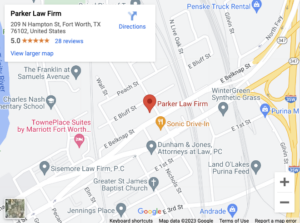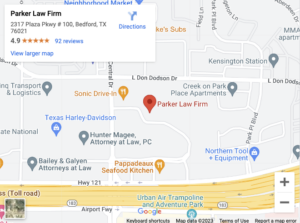
Understanding the roles of different parties in a Texas personal injury case is important, particularly if you have been injured. One of the main figures in a personal injury lawsuit is the defendant. But who is the defendant, and what is their role?
Who is a Defendant in a Personal Injury Case?

The defendant in a personal injury matter is the person or business being sued for allegedly causing a victim harm or injury. The injury generally occurs due to negligence.
The defendant may be an individual, corporation, government entity, or other organization that you believe is responsible for your injuries.
Who is a Plaintiff in a Personal Injury Case?
The plaintiff is the person who has suffered injuries and damages. They generally initiate a personal injury case by filing a claim with an insurance company or filing a lawsuit in a Texas state or federal court.
You will likely be the plaintiff if you or a loved one have been injured. As a plaintiff, you will have the burden of proving that you were harmed by the defendant’s actions to recover compensation.
Examples of Defendants in Texas Personal Injury Cases
Defendants in personal injury cases can vary widely. An experienced personal injury lawyer helps hold wrongdoers accountable in different types of claims.
Some common examples include:
- Drivers: The defendant in a car accident, truck accident, or motorcycle accident case is typically another driver who allegedly caused the collision through negligent or reckless driving.
- Property Owners: The defendant in a slip and fall accident claim might be the owner or manager of the property where the injury occurred, especially if the fall was due to unsafe conditions.
- Manufacturers: The defendant in product liability cases may be a manufacturer, distributor, or retailer of a defective consumer product that caused injury.
If you’ve been injured, speak with a Texas personal injury lawyer. They can evaluate your case and identify all potential defendants, including individuals and corporations.
What is a Defendant’s Role in a Personal Injury Case?
As the plaintiff, you have to successfully prove your case to receive compensation. You must do so by a preponderance of the evidence. However, once you present your case as the plaintiff, the defendant can provide evidence to counter your claims. The defendant’s goal will be to show that they were not negligent or responsible for your injuries or that their actions did not directly cause them.
A defendant may focus on arguing:
- No negligence: A defendant can argue that they acted reasonably and did not breach a duty owed to you.
- Comparative negligence: A defendant might claim that your own actions contributed to your injuries. This concept, comparative fault, can significantly reduce or eliminate a defendant’s liability.
- No causation: The defendant may argue that their actions were not the direct cause of your injuries.
- Assumption of risk: A defendant might argue that you were aware of the risks involved in a particular activity and voluntarily chose to take those risks.
An experienced Texas personal injury attorney can help predict a defendant’s arguments in court.
What Does a Defendant Do?
Defendants have a unique role in personal injury cases. This includes several key actions and responsibilities, including:
- Respond to the petition: You will initiate a lawsuit by filing a petition. After being served, the defendant must file a written answer with the court that responds to the allegations.
- Conduct discovery: The defendant participates in the discovery process, which involves gathering and exchanging information with your attorney. This may include answering written questions, participating in depositions, or producing documents.
- Participate in settlement negotiations: Most personal injury cases are settled out of court. The defendant often engages in settlement negotiations through their attorney or insurance company to try to resolve a case before trial.
- Go to court: The defendant and their attorney will present their defense, cross-examine witnesses, and provide evidence to refute your claims if the case goes to trial.
Personal injury lawyers understand the litigation process and what to expect from defendants throughout the case.
A Fort Worth Personal Injury Lawyer Can Help You Hold a Defendant Liable For Your Damages
If you have been injured in Fort Worth and believe someone else’s negligence is to blame, speak with a personal injury attorney. Our team can help you understand your rights, evaluate your case, and proceed through the legal challenges ahead. Schedule a free consultation today.
Contact an experienced personal injury attorney from Parker Law Firm Injury Lawyers today at (817) 839-3143 for an initial free case evaluation.
Other Resources
- Evaluating Your Claim
- Personal Injury Case Process
- The Parker Law Firm Injury Lawyers Introduction
- What are Pain and Suffering Damages?
- What Happens In A Personal Injury Case In Texas?
- Why Should I Contact A Personal Injury Attorney Early On?
- Why Hire Parker Law Firm Injury Lawyers In Texas
- Why Should I Contact A Personal Injury Attorney Early On?
- Why is Parker Law Firm Injury Lawyers in Bedford Unique?


